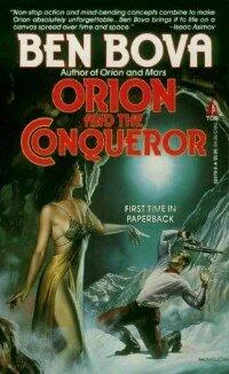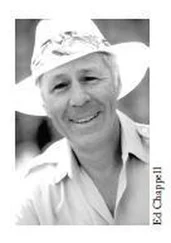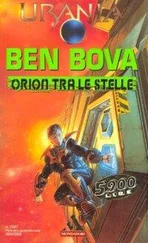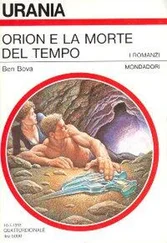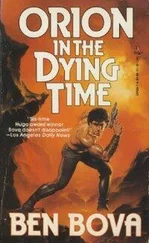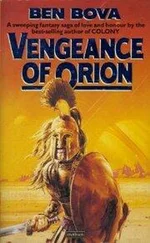We reached the flat top of the cliff without trouble and stood gazing at the Parthenon and the other temples. The Parthenon was absolutely breathtaking: graceful fluted columns, perfect Pythagorean symmetry, wonderful friezes along the roof line so marvelously carved that the cold marble figures seemed almost to come alive. I had seen it before, I realized. It stood, in all its original harmonious balance, in the empty city of the Creators that I had visited in my dreams.
It was wondrously beautiful, especially in the soft silver radiance of the moonlight. And standing in front of it was the giant statue of Athena, warrior goddess and patroness of the city, goddess of wisdom whose sacred symbol is the owl.
We all stood gaping at the marble splendors of temples and statues. All of us except Alexandros. He took everything in with a single glance, then strode purposefully toward the statue of Athena.
I hurried after him.
“They say you can see the sunlight glinting off her spear tip from the harbor of Piraeus,” he told me.
The gigantic statue was clad in ivory. Her upraised spear reached higher than the Parthenon’s peaked roof. In the moonlight Athena towered above us. Her face was painted, her eyes as gray as my own. But empty, blank, cold ivory.
Alexandros started up the temple steps. “There’s a smaller statue inside. They say it’s clothed in gold.”
It was. This statue was merely twice life-size, much more graceful, much more lifelike. In the shadows inside the temple it seemed to glow with an inner radiance. It’s the gold leaf of her robe catching stray moonbeams , I told myself. And then I looked up into her face.
I recognized her. Athena, Anya, Ardra, I had known her under many names in many times and places. Known her and loved her. And she had loved me. But now I was alone in this timeplace, without her, without my love, lost and abandoned.
I felt a cold dark misery enveloping me. I could remember so little, yet I remembered her. The face of this statue was the face of the woman I had loved. No, not a mortal woman. A goddess.
I was a creature, a mortal fashioned by the Creators to do their bidding. I had dared to fall in love with a goddess who had dared to take human form and fall in love with me. And now I was without her.
I strained with every fiber of my being to make that statue stir, to bring it to life, to have her breathe and move and smile at me.
But it remained cold marble sheathed in gold. I could not reach beyond its form to find the goddess it represented.
“Come on,” said Alexandros brusquely. “I’m getting cold. Let’s go back to our beds.”
Feeling as cold and dead as the stone all around us, I followed him back to the house of Aeschines.
The meeting of the Assembly was held in the open air, under the crisp clear blue sky, in the natural auditorium created by the hill slope facing the Acropolis. A huge crowd turned out. Although only free male citizens could vote in the Assembly, there was no law prohibiting the whole city from listening to the orators. I imagined that clever demagogues could work up the crowd to fever pitch and sway the voting citizens with mob passion.
The orators had to compete with the vendors from the market place hawking broiled lamb strips, wine, nuts, even honeyed fruits. And when the wind gusted from the direction of the Agora there were the smells of butchered meat and dried fish in the air. And flies.
The orators’ stand was cut out of the natural rock of the hillside. Off to one side the fifty members of the city council sat on stone benches.
Demades was the first to speak. He was tall and slim, elegant-looking. His powerful deep voice carried well all the way to the rear of the crowd, where I stood with Alexandros and his Companions. I was tall enough to see over the heads of the throng, but Alexandros had to stand on tip-toe and try to see between those in front of us.
“Why should we tax ourselves to fight a man who harbors us no ill-will?” Demades asked. “What do we care of the petty squabbles in the northern lands? Philip has no intention of fighting us; why do we strive against him?”
A voice in the crowd shouted back, “He stole our grain!”
Seeming to ignore the heckler, Demades went on, “This pointless war increases our taxes, drains our treasury, and sends our navy out on foolhardy missions. Philip has no desire to harm us. Even when he seized the grain harvest from our ships he returned it to us in exchange for a city that we neither want nor need.”
He went on for what seemed like hours, stressing the cost of the war against Philip and its pointlessness, pounding home again and again how high taxes had been raised to prosecute the fight against Philip.
“And what have we gained from our sacrifices? Nothing whatsoever. Philip remains in his own land, fighting against his fellow barbarians, not against us.”
I saw Alexandros’ face twitch in an angry tic at the word barbarian as he leaned on the shoulders of Ptolemaios and Hephaistion, both of them a good head taller than he.
At last Demades finished and Demosthenes took the platform. The crowd stirred. This was what they had come for.
He was a small man, with narrow shoulders and a slightly bent posture as he walked slowly to the center of the platform. His hairline was receding, although his hair was still quite dark and his beard thick and bushy. His eyes were deep-set beneath dark brows; I suspected that his beard hid a weak chin. His robe was plain, unadorned white wool. Clasping his hands in front of him, he stood with balding head slightly bowed until the vast throng stilled into absolute silence. I could hear the breeze sighing; a bird chirped in the trees behind us.
Demosthenes began slowly, dramatically, gestures measured to each phrase almost as if he were dancing in rhythm to his own words. His voice was higher than Demades’, not as powerful, yet it carried back to us well enough. He did not try to counter Demades’ arguments; indeed, he spoke as if he had not even heard them. And then I realized that Demosthenes had memorized his speech. He was not speaking extemporaneously; he was reciting a carefully-rehearsed performance, each gesture and stride across the platform perfectly timed to suit his lines. It was a long and intricate poem that he was delivering to the expectant audience, unrhymed but in careful cadence. The Athenians loved it, sighing with pleasure at his phrasing, his exact choice of words, his use of wit and even invective.
Alexandros’ face reddened as Demosthenes spoke of “this barbarian king, this sly dog, this wine-besotted beast who wants to take our freedom from us.” His attack on Philip was personal and highly emotional. Within a few minutes he had the crowd entirely in his hands.
“Athens is the light of the world, the best hope for freedom for every man. Our democracy shines like a beacon against the darkness of tyranny. Let Philip know that we are unwilling to permit the destruction of this democracy which our fathers and our fathers’ fathers have bequeathed to us by their blood and sacrifice. Let Philip know, whether he wishes us well or ill, that we will pay any price, bear any burden, and oppose any foe to assure the survival of our democracy here in Athens and its spread across the world.”
The crowd shook the city with its roar of approval. They applauded and cheered and whistled and stamped their feet on the bare ground for nearly a quarter of an hour. Demosthenes waited patiently for them to quiet down, hands folded and head bowed. Then he continued.
“There are those who claim that Philip bears us no ill will. How do they know this? Has Philip spoken to them of his ambitions toward us? Are they in Philip’s employ, taking silver and gold from the tyrant to lull us into passivity and inaction? Nothing is so easy to deceive as one’s self; for what we wish, we readily believe. Yet the facts speak for themselves.
Читать дальше
